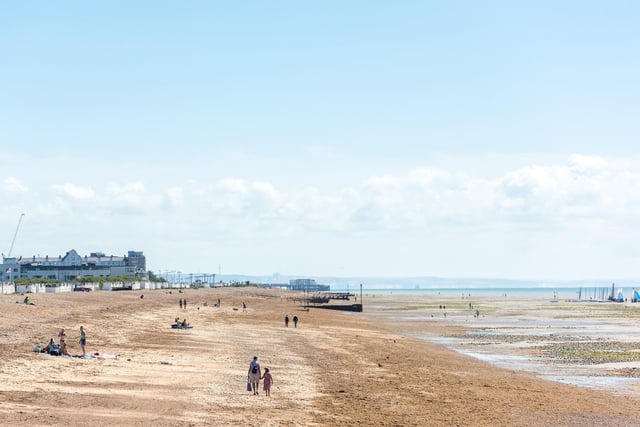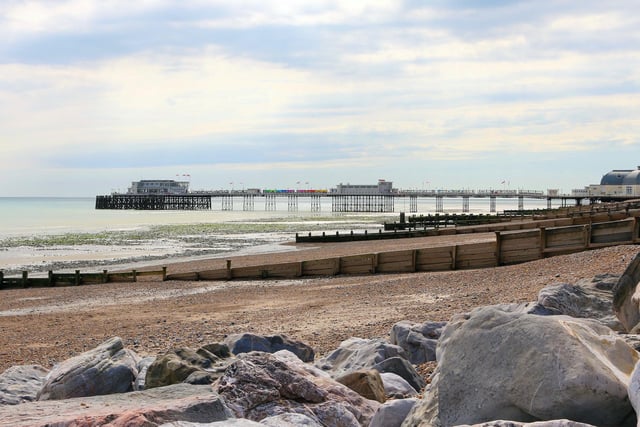Worthing Borough Council’s environment lead demanded answers from Southern Water following allegations the supplier ‘repeatedly spilled sewage into the sea off Sussex’.
An investigation by the BBC suggested that the water company discharged sewage off the coast last year on days when it was not raining, known as ‘dry spilling’.
Southern Water said the date was acquired through an EIR request, focusing on certain geographical areas – ‘especially those with groundwater challenges’ – which they then cross referenced with Met Office data.
A Worthing Borough Council spokesperson said: “Dry spilling is banned as it can lead to higher concentration of sewage in waterways, which can damage ecosystems and affect human health. The BBC report suggests there were hundreds of such discharges last year.”
Vicki Wells, Worthing’s cabinet member for the environment, said the reports were ‘hugely concerning’ and asked for assurances from Southern Water that Worthing ‘hasn’t been affected by dry spillages’ and ‘will not be in the future’.
She added: “From our initial communications with Southern Water, it doesn’t appear that Worthing has been affected by these discharges and our environmental officers are busy seeking confirmation of this.
“We want assurances that dry spills have not occurred locally and confirmation from Southern Water that they are immediately acting on the information provided by the BBC investigation. Residents need confidence that future dry weather won’t result in damaging sewage releases.
“I personally welcome the news that Southern Water volunteered this data to the BBC. This has at least ensured that these dry spills have been identified, but sadly highlights the continued issues of sewage pollution.”
Southern Water told this newspaper that it does not expect Worthing to be affected by ‘dry spills’ which are ‘caused by high groundwater’ which ‘forces its way into our sewers – and private sewer pipes’. A spokesperson added: “Groundwater is not an issue of concern in the Worthing area.”
John Penicud, director of wastewater operations, said ‘so called dry spills’ are a ‘complex issue’, adding: “Water is a powerful force of nature – and high groundwater conditions can lead to rising water finding the path of least resistance into a network of sewer pipes and manholes, and a discharge made up of groundwater is not caused by rainfall and can happen in dry weather. It is required to be reported as a ‘spill’.
“The problem is especially challenging in areas prone to flooding, as mitigation measures such as sewer relining and manhole sealing redirect flows and groundwater can then cause flooding. Private, illegal connections to the system are another potential source.
“We work with the Environment Agency and stakeholders to cut these so-called ‘dry spills’ – and all forms of water and wastewater releases.
“Our nature-based solutions are already showing promise in reducing dry spills and we are doing this at Lavant and other sites.
“One of our storm overflow release reduction pathfinder projects in the Pan Parishes area of Hampshire is focusing on this issue. One way we’re tackling it is by sealing private pipes through using an innovative chemical called Tubogel.”
Mr Penicud said the company is engaging with regulators and stakeholders to ‘develop plans for cleaner rivers and seas’.
“We are funding £3 billion to improve the environment and give our customers the service they deserve,” he added.
"Our shareholders have injected more than £1.5 billion since 2021 to fund this work.”
In a move to ‘bring increased protection’ to Worthing’s coastline, the borough council is currently finalising bathing water applications for two sections of popular shore - one opposite Beach House Grounds and the other opposite Sea Lane in Goring.
A council spokesperson said: “Community volunteers have been counting the numbers of swimmers enjoying the water at these locations over the summer as part of these applications.
“Designated bathing water zones allow the Environment Agency to test the seawater for bacteria annually, which helps to identify sources of pollution - a move which would help hold polluters to account and allow Worthing to achieve the highest bathing water classification.
“To assist its applications, the council is seeking feedback to help demonstrate these two sections of shore are commonly used by visitors for activities such as swimming and watersports. The form takes no more than one minute to complete and closes next Friday (September 15).
Click here to complete the consultation for Beach House Grounds and find out more. Click here to complete the consultation for Goring.

1. Goring Beach
A picture from Goring Beach looking east towards Worthing Pier Photo: James Pike / Worthing Borough Council

2. Worthing coastline
The stretch of coastline opposite Beach House Grounds in Worthing Photo: James Pike / Worthing Borough Council

3. Worthing beach
Worthing beach at low tide Photo: Worthing Borough Council